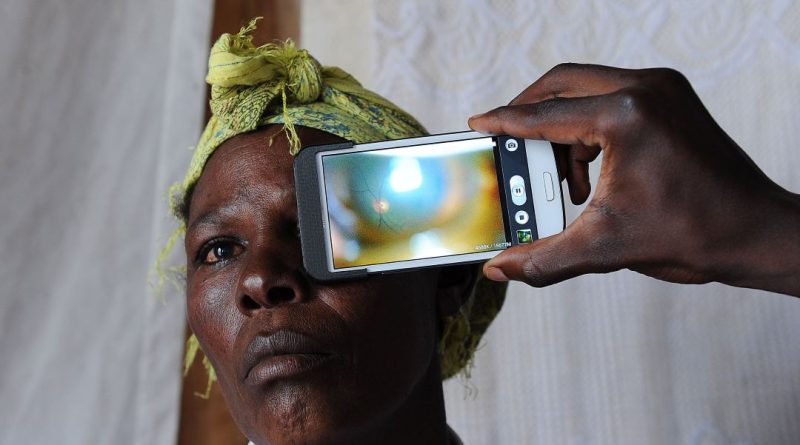AI could transform healthcare in Africa only if governance is involved
Experts say artificial intelligence could benefit African healthcare systems but only if those benefits are retained in the region and involve governance. AI is hyped to transform healthcare around the world, and not just in higher-income countries like the US and China.
In Africa, artificial intelligence is being used across Africa to aid healthcare, from managing datasets in Morocco to reading genomes in South Africa, and from analyzing medical images in Ghana to tracking COVID-19 in Ethiopia.
“The last three years has seen a boom in people using AI to solve healthcare problems on the continent,” said Ayomide Owoyemi, a public health and technology expert at the University of Illinois, US.
The technology is helping to deal with the region’s biggest healthcare challenges, including malaria, tuberculosis (TB), and HIV/AIDs.
TB diagnostics in Mozambique
So far, the most successful AI projects have been with disease diagnostics.
For instance, healthcare workers in Mozambique have tested AI as a way to detect TB in a high-security jail. They used portable X-ray machines connected to an AI program to diagnose the disease in people in less than five minutes, and as accurately as doctors.
“This was the first time it was demonstrated that this AI approach can work in prisons. Now this needs to be scaled up to everybody who needs it, ultimately to the whole country,” said Suvanand Sahu, Deputy Executive Director of Stop TB, who led the project in Mozambique.
TB is a major healthcare issue. The WHO estimates 10 million people develop TB globally each year, but says that about 3 million people are not getting the healthcare they need.
“TB is the biggest killer amongst all infections, and while global TB incidence is declining, it’s not declining as fast as we would like. AI technology is evolving and there are many uses for it in healthcare, and reducing the global TB burden is one of them,” Sahu told DW.
AI filling the gap of missing doctors
One of AI’s biggest benefits in Africa is helping health workers do more with limited resources.
Owoyemi told DW that AI can fill the roles of doctors and other highly skilled health workers who leave the continent to work in other parts of the world.
“One of the biggest challenges we face now on the continent is that countries can’t retain their healthcare workforces. Nigeria loses many doctors to wealthier countries. It’s a battle we can’t win because people move to where pay is better,” he said.
Low numbers of doctors mean that most people who currently deliver healthcare at the primary level are community health workers.
“What AI can do is to augment lower skilled healthcare workers who have actually been delivering healthcare. This is essential over the next years because we are going to keep losing doctors,” Owoyemi said.
Retaining AI projects in Africa
AI is estimated to bring $1.2 trillion (€1.1 trillion) in economic growth to Africa by 2030. However, a major challenge is retaining the benefits of AI projects in Africa in the long run.
Owoyemi said most healthcare projects so far had been pilot studies that seldom translated to long-term changes in the system.
“Programs are mostly funded for two or three years from the outside and use external workforces. Afterwards, the program packs up and leaves. But when African governments are funded, they can create organizations and policies that ensure the program stays alive for as long as possible,” he said.
Owoyemi said it’s important that African countries start creating specific funds and agencies to manage the long-term integration of AI into healthcare systems.
With local governments and organizations leading the way, they can focus on healthcare priorities, with AI projects set by local needs, rather than what external partners dictate.
And the benefits would be much wider than healthcare. AI healthcare projects need skilled workers trained in sectors such as computing, education, and energy.
“If a local government runs AI projects, they have to train people and establish systems of governance, and those skills and knowledge are retained in the system. This brings sustainable and long-term benefits,” said Owoyemi.
Infrastructure challenges
Rolling out more AI healthcare programs in Africa has its challenges. One is limited infrastructure large parts of Africa don’t have the power to supply internet access to run large-scale AI projects reliably.
“The difficulty is deploying computing systems to frontline healthcare workers. They work in places where infrastructure is poor: no power, no PCs, so we need to consider how we can deploy AI,” said Owoyemi.
Another challenge is the data itself. Most machine learning algorithms are trained on datasets stored outside Africa, which limits their use in tackling healthcare issues specific for African people.
A well-known example is in genetics, where 95 percent of data is from European genomes, which limits the use of AI in analyzing genomes from non-European people and detecting diseases.
But things are improving, there are major programs underway at African universities and private companies collecting healthcare data in Africa, allowing local companies to train AI models with region-specific data.
Sahu said his organization, Stop TB, is also involving more African research teams in building new AI systems to address region-specific healthcare concerns.
“AI is currently not good enough in distinguishing silicosis, a disease caused by inhaling dust, which is common in the mining industry of southern Africa. We’re now working with African countries to develop new machine learning tools for distinguishing silicosis from TB,” Sahu said.
And ongoing work in the Three Million African Genomes (3MAG) project aims to sequence the genomes of three million people in Africa. It has already identified genetic variances in ethnolinguistic groups in Africa that were previously unknown.




